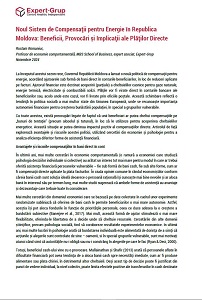
We kindly inform you that, as long as the subject affiliation of our 300.000+ articles is in progress, you might get unsufficient or no results on your third level or second level search. In this case, please broaden your search criteria.

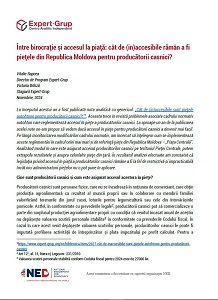
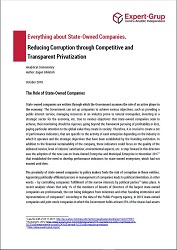
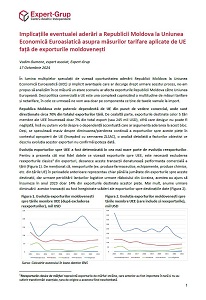
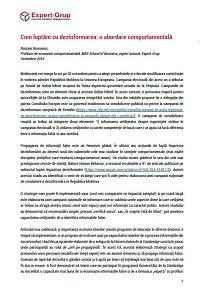
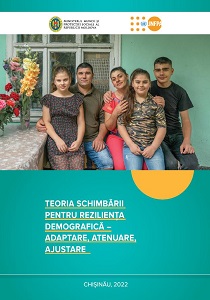
The Theory of Change for Demographic Resilience represents an analysis of the demographic context in the Republic of Moldova and sets policy priorities for transforming demographic changes into a development opportunity. This is based on 3 pillars: adaptation, mitigation and adjustment. The Theory of Change for Demographic Resilience is developed by the UN Population Fund (UN FPA), based on the partnership with the "Expert-Group" Independent Analytical Center and the Demographic Research Center, at the request of the Ministry of Labor and Social Protection.
More...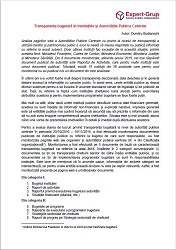
The analysis of the web pages of the Central Public Authorities regarding the level of transparency of the use of public money and patrimony revealed that the vast majority do not publish information with reference to this subject. Only a few institutions are an exception to this situation, among them being: the Ministry of Finance, the Court of Accounts, the Ministry of Economy, the Ministry of Justice and the Ministry of Health. Out of 8 monitored documents, related to 2015, the most widespread document published by the authorities is the Activity Report, which for many institutions is the only published document. At the same time, there are 15 institutions out of 38 analyzed that for the monitored year did not publish any of the analyzed documents.
More...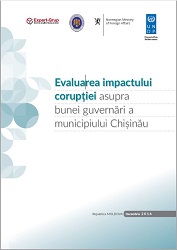
The Independent Analytic Center "Expert-Group" carried out this Study on the basis of the service provision contract, concluded with the United Nations Development Program, within the Project "Strengthening the capacities of the National Anti-Corruption Center to exercise the functions of prevention and analysis of corruption", implemented by UNDP Moldova, with the financial support of the Ministry of Foreign Affairs of Norway. The main purpose of the Study is the comprehensive assessment of the impact of corruption on the good governance of the Chisinau Municipality and the formulation of a set of recommendations to prevent corruption and reduce its incidence in the Capital City Hall.
More...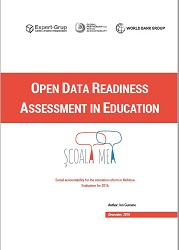
Open data readiness assessment is carried out as part of “Scoala Mea - Empowered citizens enhancing accountability of the education reform and quality of education in Moldova” Project. The main goal of the project is to encourage Moldovan citizens to engage with local, regional and national authorities in evidence-based policy and budget dialogue regarding the reform of educational sector, the quality of services and the development priorities of primary, lower secondary and upper secondary schools, and to create an environment where the social accountability initiatives could develop. In this context, the data opening in educational system is both a condition and a factor in the development of the social audit of schools. Thus, taking into account the crucial importance of the data opening in the social audit of schools, the aim of this assessment is to present a complex picture of the availability of open data in education, which could be used first of all to foster development of social audit in schools.
More...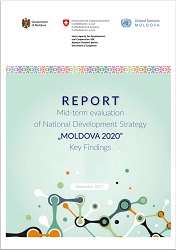
This document presents the results of the evaluation and analysis of the National Development Strategy (NDS) "Moldova 2020" implementation, which is the main national strategic planning document drafted by the Government and adopted by the Parliament in July 2012 for the period until 2020. In accordance with the provisions of the NDS, the Government, with the support of UN Moldova, initiated the process of evaluation of the implementation of the NDS for the period 2012-2015. The objectives of this assessment included: establishing how NDS fulfilled its function as a central strategic planning document in the field of sectoral policies and budgetary allocations; analysing the impact of NDS in areas of priority policies through predetermined monitoring and evaluation indicators; and identifying the lessons learned. All these activities were undertaken in order to design a new national development strategy "Moldova 2030".
More...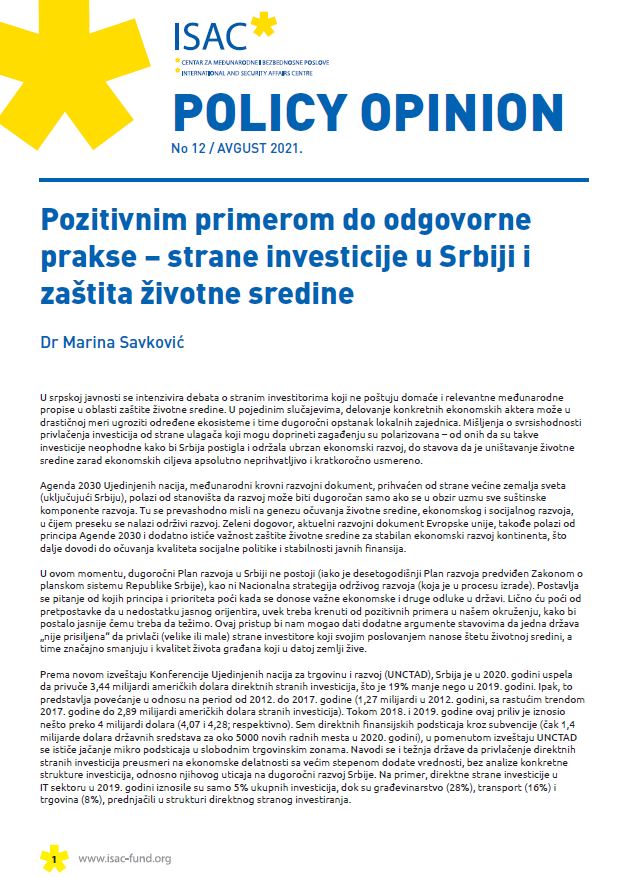
As a result of the conference “Environmental Protection and Economic Growth: Experiences from Japan, the EU and Serbia”, ISAC presents the paper “Towards responsible practice with a positive example – foreign investment in Serbia and environmental protection”. Are foreign investments which do not respect environmental regulations really a precondition for economic growth and development? Is there a different way of doing business that involves protecting environment? Read what the international community says, and what is the practice of Serbia, in this political perspective from Dr. Marina Savković.
More...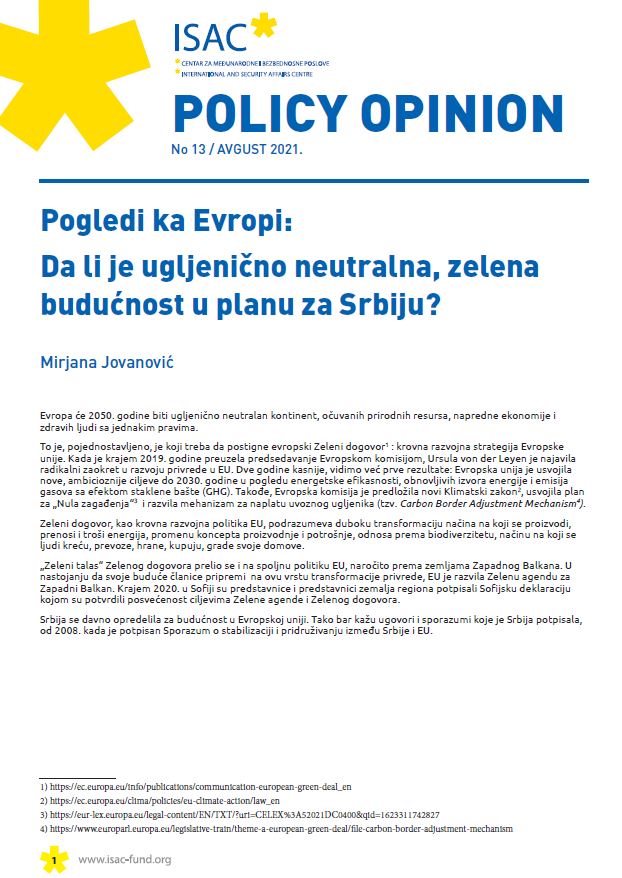
As a result of the conference “Environmental Protection and Economic Growth: Experiences from Japan, the EU and Serbia”, ISAC presents the paper “Views towards Europe: Is a carbon-neutral, green future planned for Serbia?” In this paper, Mirjana Jovanović talks about the EU Green Agreement and the Green Agenda for the Western Balkans and the implications that these policies have on Serbia’s European path and the everyday life of its citizens; the green transition to renewable energy sources and Serbia’s readiness for a carbon-neutral future.
More...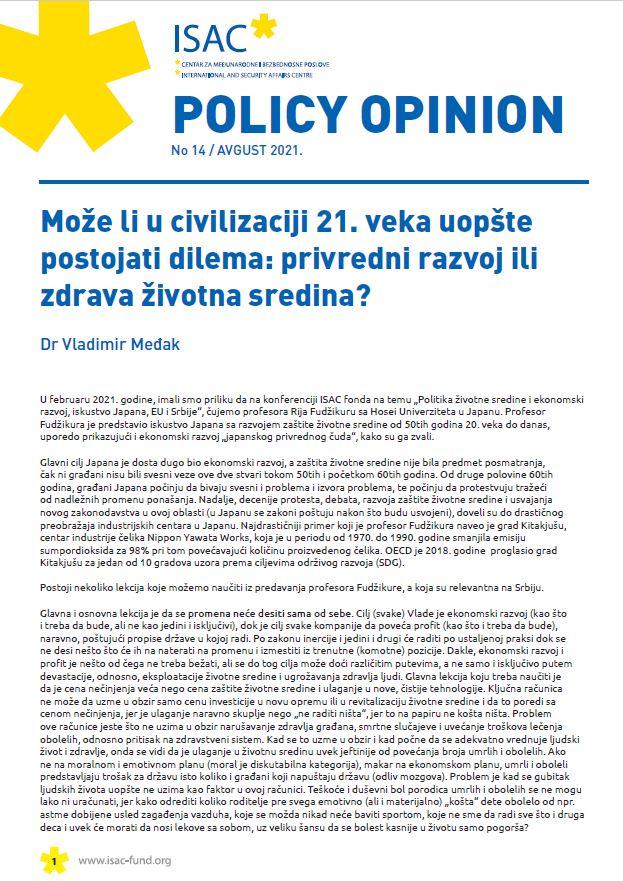
As a result of the conference “Environmental Protection and Economic Growth: Experiences from Japan, the EU and Serbia”, ISAC presents a paper “Can there be a dilemma in 21st century civilization: economic development or a healthy environment?” Dr. Vladimir Medjak writes how Japan has aligned economic growth with the environment; why not doing and not calculating people’s health is more expensive than investing in cleaner technologies and what society can do in order for the Government to change its approach in this field.
More...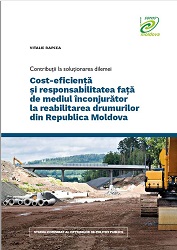
This document represents a comparative study of the public policy options for ensuring the useful mineral substances needed for the rehabilitation of the roads in the Republic of Moldova, in accordance with the objectives of efficiency, reducing the impact on the environment and unwanted externalities. The problem of the use of useful mineral substances for earthworks in the construction of roads, railways, dams and for the prevention and stopping of dangerous geological phenomena has always been topical, making it the subject of journalistic investigations or audit reports of the Court of Accounts, and the procrastination of its solution brought numerous damages to the environment and the state budget, being documented multiple cases of illegal exploitation of the basement by private and state enterprises.
More...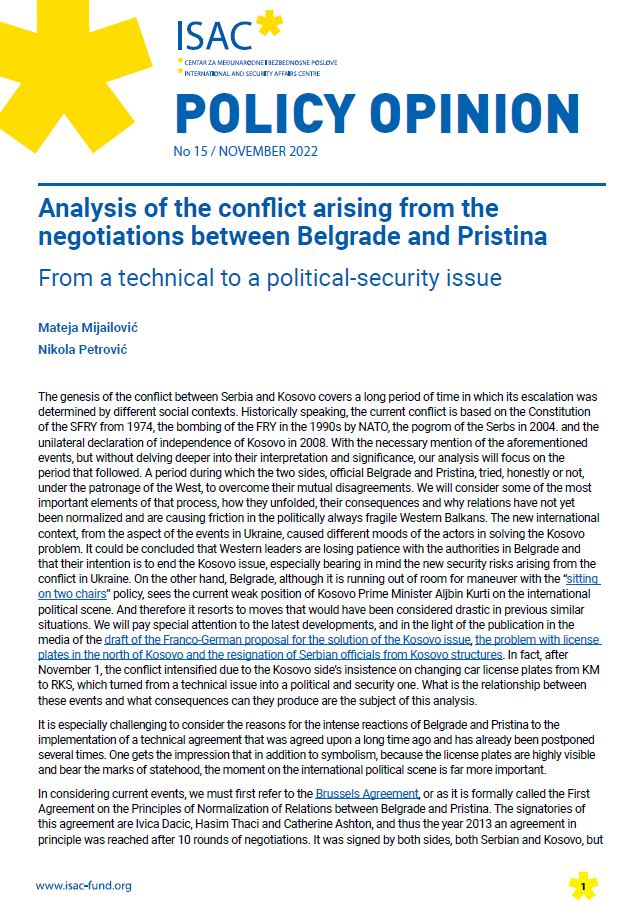
The genesis of the conflict between Serbia and Kosovo covers a long period of time in which its escalation was determined by different social contexts. Historically speaking, the current conflict is based on the Constitution of the SFRY from 1974, the NATO bombing of the FRY in the 1990s, the pogrom of the Serbs in 2004. and the unilateral declaration of independence of Kosovo in 2008. With the necessary mention of these events, but without delving deeper into their interpretation and significance, this analysis focuses on the period that followed. A period during which the two sides, official Belgrade and Pristina, tried, honestly or not, under the patronage of the West, to overcome their mutual disagreements. This paper considers some of the most important elements of that process, how they unfolded, their consequences and why relations have not yet been normalized and are causing friction in the politically always fragile Western Balkans.
More...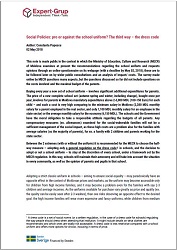
This note is made public in the context in which the Ministry of Education, Culture and Research (MECR) of Moldova examines at present the recommendations regarding the school uniform and requests opinions through an online questionnaire on its webpage (with a deadline by May 02, 2018); these are to be followed later on by wider public consultations and an analysis of impact/ costs. The survey made online by MECR questions many aspects, but the questions discussed so far did not include questions on the costs involved and the maximal budget of the parents.
More...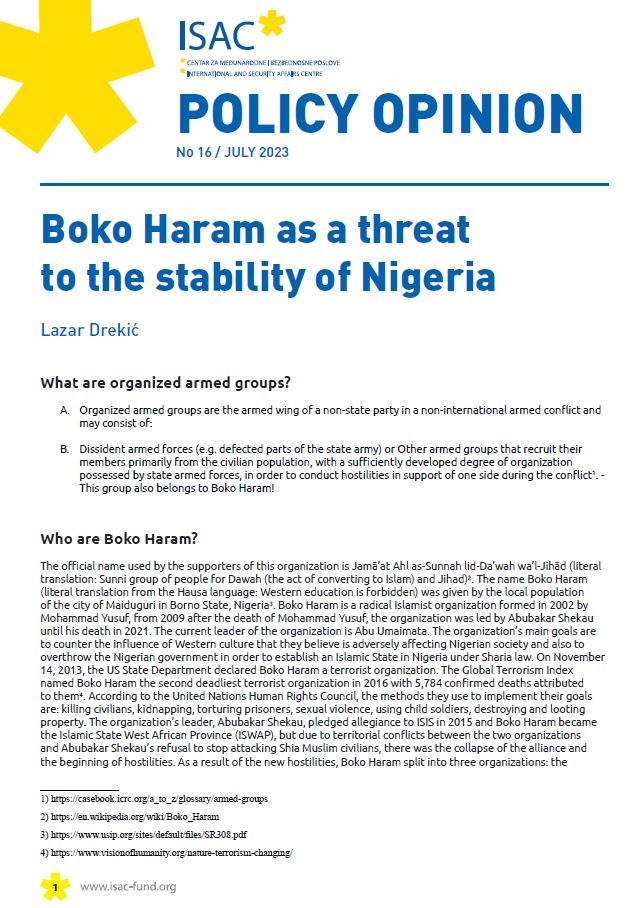
This article will show how extremist religious movements can destabilize a sovereign state. In this case, we are talking about the Boko Haram movement, which is portrayed as a destabilizing factor in the Federal Republic of Nigeria, in the West African region.
More...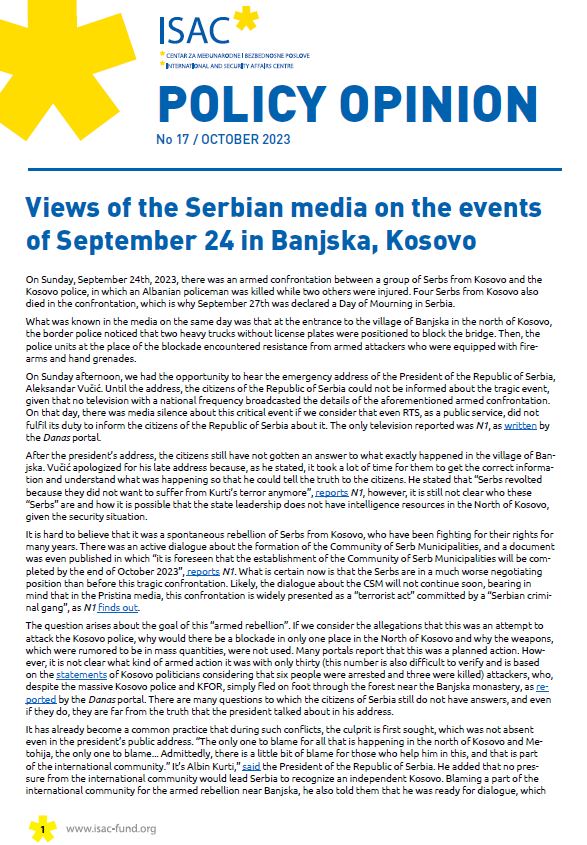
Tensions in the North of Kosovo culminated on September 24 in Banjska when an armed confrontation occurred between a group of Serbs from Kosovo and the Kosovo police. In this article, we show the views of the Serbian media on the events in Banjska immediately after this tragic event.
More...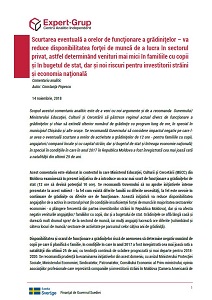
The purpose of this analytical commentary is to come up with new arguments and to recommend to the Government/Ministry of Education, Culture and Research to keep the current diverse operating regime of kindergartens and even expand later the number of kindergartens with a long schedule of hours, especially in the municipality Chisinau and other cities. It is recommended to the Government to consider the negative impact that a possible shortening of the activity hours of kindergartens by 12 hours would have - for families with children, local employers/companies and foreign capital, but also the state budget and the entire national economy; especially in the conditions where in 2017 the lowest birth rate in the last 25 years was recorded in the Republic of Moldova.
More...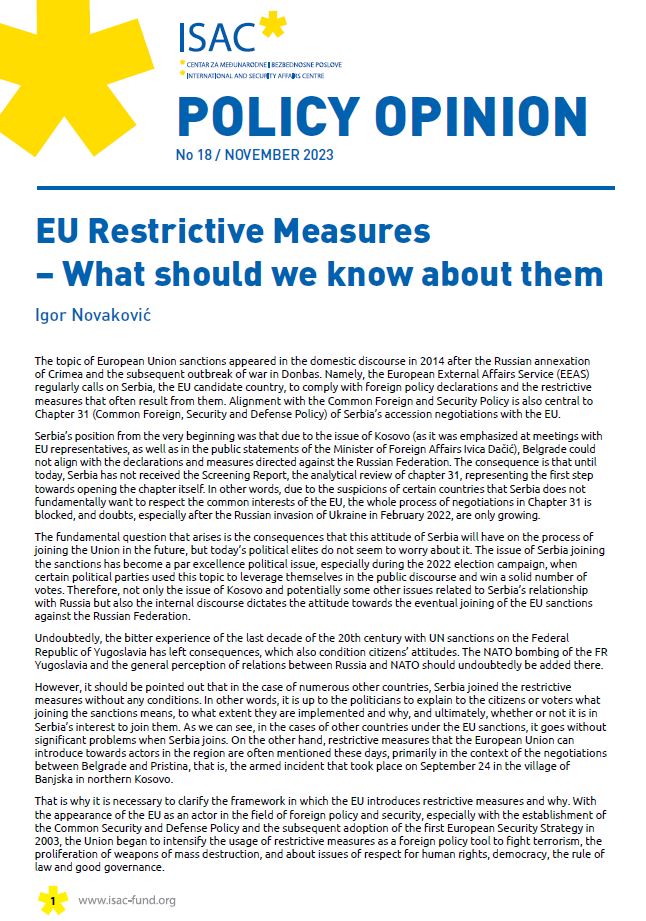
In the context of current conflicts and changes in the international environment, European Union sanctions are becoming an increasingly frequent topic in the domestic public. In this article, we show you what EU restrictive measures mean, who they apply to, and how they are established.
More...